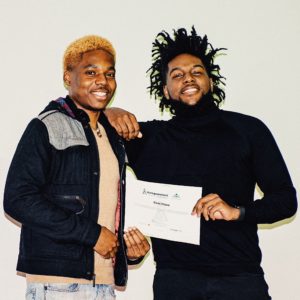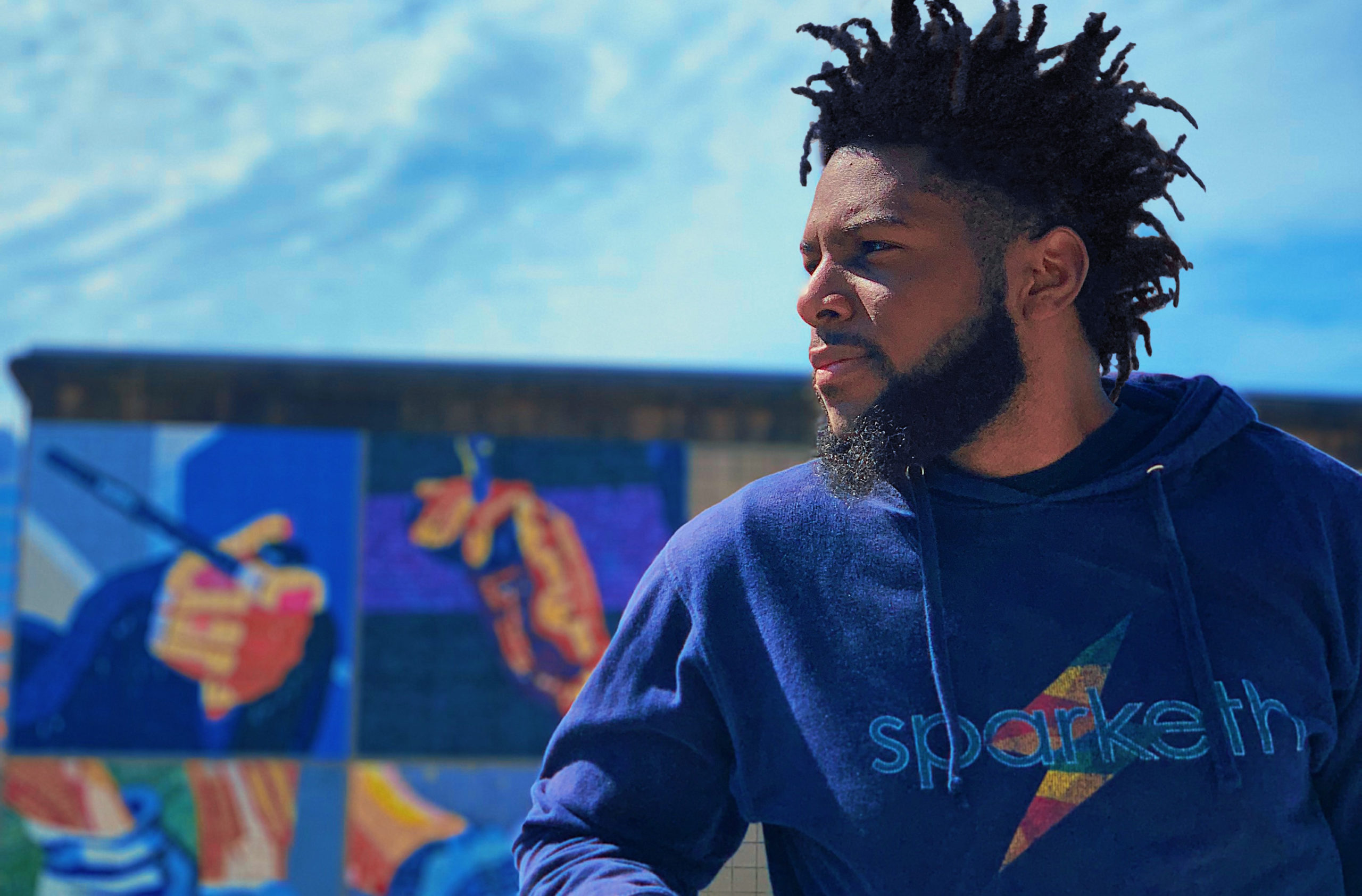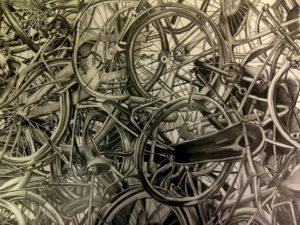“Creativity is always an extension of you. You can only create as far as you know, which is why it’s always important to keep learning.”
-Dwayne Walker, Sparketh CEO
A professional artist and the CEO/co-founder of Sparketh, Dwayne is passionate about Sparketh’s mission to foster and nurture creativity and provide valuable artistic instruction on a virtual platform. In this interview, we chatted about how Dwayne’s own artistic and educational background shaped Sparketh’s development, his views on the power of art and learning, and his hopes for Sparketh’s future.
On His Role at Sparketh
“Yes, technically I’m the CEO,” Dwayne says when I ask him about his role at Sparketh. “But that’s just a name to me. In reality, Tim (Sparketh’s vice president/ co-founder Tim Samuel) and I work together as a team.”
“Within that team,” Dwayne continues, “I’m more of the ‘visionary.’ I have the dreams-the overall vision-for what Sparketh can and should be. A lot of times those dreams are very imaginative and intuitive–which is why I love it when Tim is on board with one of my visions for Sparketh. If I dream it, and Tim approves it, it means it might actually be something we can do!”
He continues, “Sometimes, I have ideas that are too big or that aren’t something we should be focusing on right now, but if Tim is also passionate about a vision that I have for Sparketh, it means that he’s already making a plan for how it can happen. He’s a genius with knack for reverse-engineering. Because things with Sparketh change all the time, we are always working together to figure out how those constant changes affect Sparketh’s ongoing development.”

Dwayne, a professional artist, teaches many of the art courses on Sparketh’s Website, something he’s been doing since the company’s beginning. Now that Sparketh has grown, additional art instructors have joined Sparketh’s team to teach students an even more diverse range of artistic skills and styles.
In terms of his day-to-day activities with Sparketh, Dwayne also works on the branding and marketing, as well as conducting a lot of meetings and in-person communications. Though Sparketh began on a much smaller scale – with Dwayne teaching art courses and Tim filming, editing and uploading videos online – it has since grown into a larger company with a growing team of helpers. However, even as Dwayne and Tim delegate some of their former activities, they continue to maintain their primary roles, using the opposite skillsets that made the idea for Sparketh possible in the first place.
Creativity Fueled by Sacrifice, Learning, and Courage
When I ask Dwayne to tell me something unique about his background, the answer isn’t what I expect. I expect him to immediately tell me about his art, or about his artistic inspirations. While we talk about those things later, that’s not where he begins.
He starts by telling me about something his mother taught him.
“I was born and raised in Atlanta, but my parents moved here from Jamaica. They both worked hard to support me and my five siblings, but then my dad was injured on the job. After that, my mom worked extra hard to not only raise us, but also to support us financially. She gave so much of herself to make sure we had what we needed.”
“My mom really taught me what sacrificial love looks like,” Dwayne emphasizes, “and in the end I think that’s really one of the most important lessons anyone can learn.”
His mother’s example of sacrificial love and giving impacted the artist and entrepreneur deeply. Dwayne brings it up a few more times throughout our interview, noting that – though his mother was not an artist herself – she repeatedly encouraged him in his own creative journey, “She supported me, creatively, in whatever way she could,” he says.
Perhaps this is one reason that Dwayne lists, “giving more than you receive,” as one of his top values. He explains. “If you can leave two good things behind for every good thing that you receive, you’re leaving the world a better place than you found it.”
He says that his other top values are learning and courage.
The Link Between Creativity and Learning
It’s apparent from talking to Dwayne that an indiscriminate thirst for learning is a very vital part of his work and life.
“I make time to read every day,” he says, early on in the conversation. “Sharing and gaining information is one of the best things I do for myself. I like to consider myself in a state of … ‘ultra-learning.’” Dwayne continues, “I have this big fear that I won’t be able to learn all that I need to learn by the time I die, so I’m always trying to learn as much as I can, about all kinds of different things. If you were to go look at my bookshelf right now, you wouldn’t be able to tell what in the world I’m into. There are books about every topic imaginable.”
For Dwayne, there is also a clear connection between learning and creativity. “Creativity is always an extension of you,” he says. “You can only create as far as you know, which is why it’s always important to keep learning.”
The Importance of Taking Risks
“Courage is another one of my greatest values,” says Dwayne. “It’s only when you step out of your comfort zone that you can really begin to see big changes and great things happen in your life.”
Courage is certainly something that has played a role in Dwayne Walker’s own life so far. A self-taught artist, Dwayne reached out of his comfort zone as a teen to compete in numerous art competitions and pursue a professional art career at a very young age. Dwayne, as well as his business partner Tim, both took several risks in order to bring Sparketh to life.
As college students perusing degrees in business, they both dropped out when they became passionate about making a plan for Sparketh, deciding to put their efforts into the project fulltime.
His Journey as a Self-Taught Artist
A large part of Dwayne’s story as an artist, and a large part of the inspiration for Sparketh, comes from his experience as a self-taught artist.
“Growing up, I loved art from an early age. I loved anything creative–but my parents weren’t artists,” says Dwayne. “They couldn’t teach me how to draw, but they did encourage my creativity in any way they could. Any type of resources I could find, I stuck to, and I taught myself.”
When asked if there was a certain point he knew he wanted to be an artist, Dwayne laughs and recalls his first official art sale:
“I’m not sure how old I was – very young- but I remember tracing a dolphin from a coloring book and my aunt buying it for five dollars. Five dollars is a lot of money for a kid — all the candy in the world. So that was my initial motivation.” He continues, “Honestly, I was also motivated to do art early on because I was competing with my older brother. He’s three years older than me and is an amazing artist, but when we were kids he took a break for a year and switched over to music. I continued doing art, and I think part of me was driven by the desire to ‘beat him’.”
Later on, Dwayne says, the motivation to pursue art became more internal.
“As I got older, I began to create art for more emotional reasons. A lot of times when I was growing up, I would feel things that I didn’t know how to put to words. Creating was the way I was able to express myself. I lived to create. At some point, I realized that I should strive to create for a living. I owe art my life in a way, because it’s become such an extension of myself.”
When he was a teenager, he began entering art competitions, winning over 50 of them. Out of these, one competition stands out among the rest in terms of the way it shaped his artistic journey.
“I almost didn’t even make it into that particular competition,” he tells me. “It was a two-part contest, and the first part involved a submission in the mail. I heard about the deadline on the radio and knew I’d have to get something in the mail that same day in order to meet the deadline. It was just a couple of hours before the post office closed, too, but I got it in in time and was selected as a finalist with 19 other people.”
“Bicycle Graveyard,” (above) was the sketch that made Dwayne one of the finalists in the competition.
He ended up winning the live competition, a drawing contest that took place at the High Museum of Art in Atlanta. This yielded a television interview and, more notably, an influential trip to Italy.
Finding Inspiration in Italy
“It (that trip) changed everything,” says Dwayne. “In Italy, I saw ‘art beyond the pencil’ for the first time. Everything in Italy is art: the food, the buildings, the museums, people painting on the street. It’s all art. There were a few competition winners on that trip, and the tour guide we were with made a point of expanding our idea of the arts. We did art related activities the whole time: everything from culinary tours to studying architecture.”
It was also in Italy that Dwayne discovered a love of painting and saw the in-person work of his longtime personal inspiration, Leornardo Di Vinci.
“I think I first saw myself in his fascination with wings,” says Dwayne, who states that he’s also always gravitated towards drawing/painting imagery of hummingbirds, wings, and (also like Di Vinci) portraits.
“I also connect with his passion for curiosity, and his love for freedom and art.” Echoing his own love of learning, Dwayne says that he also is in awe of Di Vinci’s passion mastery of a variety of interests.
“He also didn’t conform,” Dwayne adds. “He was fully focused on creating. He could by hired by one person and then later be hired by their mortal enemy. None of those politics mattered because it was all about creativity and learning for him.”
On Art Education and Homeschooling
“In many ways, Sparketh was inspired by my homeschool experience,” says Dwayne.
He explains that, while he wasn’t homeschooled for his entire education, he “bounced around a bit between different public schools and homeschooling.”
“My mom wanted to homeschool me,” explains Dwayne, “but there were years that she’d put me into public school, specifically so that I would have access to publicly funded art programs because we didn’t have the resources for classes.”
Despite this, however, Dwayne says that homeschooling was really where he got to tap into his own creativity. “Even though my mom wasn’t an artist, she’d find ways to integrate art into history or math because she knew how important it was to me. Homeschooling was really when art got to be the center of my education.”
Even though homeschooling gave Dwayne more opportunities to independently pursue art, he admits that a resource like Sparketh would have made a big difference for him.
“I know that things would have been a lot different if I’d had a resource like this (Sparketh). I always used to dream about some ultimate resource for learning art. If I’d had it, growing up, I’d be a much better artist than I am now, and it would have taken a lot of stress off of my mom. Having Sparketh-finding something anything close to it-would have been the missing key to my artistic education at home.”
Dwayne tells me that getting to connect with students, particularly those who have been looking for the missing piece in their study of art at home, has been the most rewarding part of the Sparketh experience for him so far. In particular, he recalls the very first family they signed up as clients.
“They signed up, but they also stuck with us. We got to know them, got to see the impact that Sparketh was having on their family. A lot of people sell a product and may get a good review, but they don’t really see the impact. We were able to see the impact our product had on this family for years, and that definitely helped shape our mission and gave us insight and clarity into what we were offering.”
Sparketh’s Mission and Hopes for the Future
“I would say there are probably three parts to my “unofficial” mission for Sparketh. The first is to ‘spark,’ or inspire, creativity in kids. That was idea that started Sparketh, really: we want for kids who don’t see themselves as ‘creative’ to find and tap into that part of themselves.”
“Secondly,” Dwayne continues, “we don’t just want to inspire creativity, we want to be there to nurture it, to provide continual resources to help our students foster and improve their skills.” Dwayne adds that he also feels that if a resource like Sparketh several years ago, it would have helped some of his other friends who were artistically inclined. “I had a lot of friends who were interested in art that gave up, and I feel like a resource like Sparketh would have nurtured their creativity and encouraged them to keep going.”
He continues, “Picasso said that ‘every child is an artist, but the challenge is keeping them an artist when they grow up.’ So in addition to helping ignite that initial spark, we also want to help the artists stay creative.”
“Thirdly,” Dwayne says, “I want to help empower creative individuals and to also empower the idea that ‘creativity is important.’”
“A lot of people who are creative don’t really see how it can be beneficial. I think that creativity will continue to be incredibly important in our future culture. In fact, if you look at ‘most valuable skills that employers look for’ creativity has consistently been one of the top soft skills that employers look for over the last several years.”
Future Hopes for Sparketh and the Importance of Creativity
“My wildest hope is very future-focused,” says Dwayne. “I hope that Sparketh will play an important role for kids who are learning all things creative in the years ahead. We want to be there as a hub to support all kinds of creative learning, and also to go beyond just learning. I want for us to be there to nurture creativity and to empower creative learning as creativity becomes an increasingly important part of our future. My wildest dream is that Sparketh will be a hub for anyone to come to for all things creative.”
Beyond his own enthusiasm for creativity, art, and art education for kids, Dwayne has other reasons for believing that cultivating creativity in the upcoming generation is important.
“I think that cultivating creativity in a culture of conformity is the key to the future,” says Dwayne. “We’re at this point, as a society, where everyone has plenty of skills. We’re not short on skills. But what we will continue to need are innovation and initiative–which are both impossible without creativity. In that sense, creativity is important – is key- to how the world will continue to advance.”
Interview by Kathryn Gustafson



